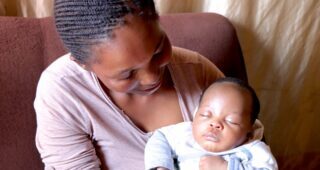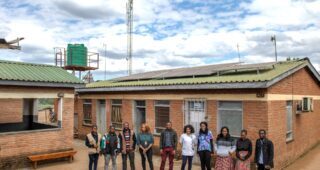IT on the Front Line of the Battle Against AIDS
You are here
by Ts’epo Ntelane, Mhealth and Informatics Officer, EGPAF-Lesotho
Growing up in Lesotho means having an early awareness of HIV. Our small, proudly independent nation was hit hard by the HIV pandemic. During the early 2000s, HIV was like a raging fire burning across our plains and mountains. It touched virtually every family with the grief of losing loved ones.
Over the past decade, the pandemic has begun to come under control, and yet Lesotho still has the second highest HIV prevalence rate in the world. Twenty-five percent of the people in Lesotho are living with HIV—but the emphasis now is on living. People are living with HIV, rather than dying.

December 1 is World AIDS Day.
Today, I take pride in being a member of the coalition that has brought Lesotho out of the dark times. When people think about combatting infectious diseases like HIV, they often picture the health workers at clinics and hospitals testing and treating patients. They don’t think about people like me, sitting in an office crunching numbers and developing charts. But a big part of our success here in Lesotho has happened because our work is driven by accurate data.
Not long ago, we relied on paper records collected at health centers throughout Lesotho, which created delays in data analysis and reporting. Now that we have implemented a client-tracking application, we are able to use Microsoft Power BI to really understand what is happening on the ground—with specificity and nuance.

As a senior mhealth and informatics officer at the Elizabeth Glaser Pediatric AIDS Foundation (EGPAF), I help aggregate data from the health centers around Lesotho and build them into easy-to-understand reports and dashboards. It makes us nimble and laser-focused on reaching the individuals who need our services the most.
Accurate, up-to-date information helps us quickly identify risks and opportunities so that we can save lives. For example, let’s say that we have 100 people at a health center who are on HIV treatment, but we can see that only 30 of them have achieved viral suppression (meaning that HIV is no longer a threat to their health). The data in our Power BI reports and dashboards can help isolate the issue and craft an intervention to bridge the gap.
It is essential that a person living with HIV take daily medication. Through our tracking system, we are able to identify clients who have missed their appointments or are failing to pick up their medication, and we quickly follow up to get them back on treatment.
The supply chain presents another potential gap in achieving our goal to eliminate AIDS. Through our data management in Power BI, we can know exactly how many patients are served by any health center and exactly how many supplies are at that location for testing and treating HIV. We also see local trends in the transmission rates. This helps us anticipate needs and adjust if we discern any slowdowns in the supply chain so that we always have supplies on hand to test for HIV and an adequate stock of lifesaving medicine.

One unique initiative we implemented in Lesotho was to prominently display a Power BI dashboard on large screens in our reception area, boardroom, and other key offices. Now, every person in our office is aware of our most important programmatic numbers.
At EGPAF, I’ve been able to grow professionally in my use of Power BI. In 2019, we received a training from Patrick LeBlanc from Microsoft. I also participate in EGPAF’s internal Power BI Learning Group, a community of practice of Power BI developers, in which we share resources and help each other with challenges. In July, I presented to the group regarding our data validation work and shared details of how we are connecting to one of our in-country data systems through Power BI.

In addition to Power BI, we use the integrated tools of M365, particularly SharePoint, to manage and share data and knowledge with our EGPAF colleagues throughout Africa, the United States, and Switzerland.
I can say that I am in love with data and with the power that it brings to decision-making and to our individual beneficiaries. Lesotho has gone from being ravaged by AIDS to reaching or surpassing global targets established by UNAIDS and the World Health Organization.
As a Mosotho, I am excited and really proud to be making an impact in the battle against this monster. My pride comes from feeling that every time when I get into the office, I am a soldier on the front line of the battle against AIDS.
This article was originally published to the Microsoft Tech Community’s Humans of IT blog. The original can be read here.
Lesotho
Community Mobilization; Strategic Information, Evaluation & Research; Strengthening Local Capacity




